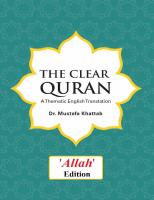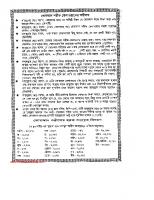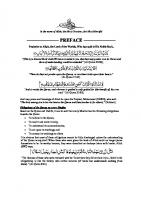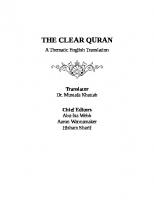Qur'an Translation as a Modern Phenomenon 9789004543553, 9789004543560
132 93 1MB
English Pages [235] Year 2023
Table of contents :
Contents
Acknowledgements
Tables
Preface
Chapter 1. The Early European Qurʾān Translation Project
1. Attacking the Holy Book of the Turks
2. The Genuine Interest in Understanding Islam
3. The Scientific Turn of the Study of the Qurʾān
4. The Sacred Books of the East
5. European Qurʾān Translation: Assessment in Context
Chapter 2. Translation as Reform
1. Colonization, India, and the Need for Reform
2. The Birth of Reform and the Indian Qurʾān Translation Project
Chapter 3. The Rise of Muslim Translations
1. Interpretation of the Qurʾān by the Qurʾān and the Bible
2. Chronological Translation
3. Collaborative Translation
Chapter 4. Indian Muslim Translations: An Apex
1. Extensive Notes
2. Poetic Form
Chapter 5. Interconnectedness of Qurʾān Translations
1. Spirituality in Yūsuf ʿAli’s Translation
2. The Spiral of Influence in Qurʾān Translations
Chapter 6. Toward a Modernist Interpretation of the Qurʾān
1. The Pluralist Qurʾān
1.1. Universalism of Prophethood
1.2. Universalism of Salvation
1.3. Muslims, Superiority and Humanity
1.4. The Politics of Otherness
1.5. Contemporary Views on Pluralism
2. Peaceful Jihad
2.1. Abrogation Theory to Downplay Peace
2.2. Ethics of War
2.3. Context-Based Explanation of the Verses of War
2.4. The Broad Applicability of Verses of Peace
2.5. Jihad in the Twenty-First Century
Chapter 7. Modernism, Traditionalism, and the Social Function of Qurʾān Translation
1. Rationality
2. Science
3. Women
Chapter 8. Alternative Modernities of Qurʾān Translation
1. The Journey of the Indian Qurʾān Translations in Europe and America
2. Politics, Religion and Qurʾān Translation in Egypt
3. Al-Azhar’s Translation: Al-Montakhab
4. State-Sponsored Qurʾān Translation in Saudi Arabia
5. Alternative Modernities: Qurʾān Translation Form and Content
Conclusion
Bibliography
Index
Contents
Acknowledgements
Tables
Preface
Chapter 1. The Early European Qurʾān Translation Project
1. Attacking the Holy Book of the Turks
2. The Genuine Interest in Understanding Islam
3. The Scientific Turn of the Study of the Qurʾān
4. The Sacred Books of the East
5. European Qurʾān Translation: Assessment in Context
Chapter 2. Translation as Reform
1. Colonization, India, and the Need for Reform
2. The Birth of Reform and the Indian Qurʾān Translation Project
Chapter 3. The Rise of Muslim Translations
1. Interpretation of the Qurʾān by the Qurʾān and the Bible
2. Chronological Translation
3. Collaborative Translation
Chapter 4. Indian Muslim Translations: An Apex
1. Extensive Notes
2. Poetic Form
Chapter 5. Interconnectedness of Qurʾān Translations
1. Spirituality in Yūsuf ʿAli’s Translation
2. The Spiral of Influence in Qurʾān Translations
Chapter 6. Toward a Modernist Interpretation of the Qurʾān
1. The Pluralist Qurʾān
1.1. Universalism of Prophethood
1.2. Universalism of Salvation
1.3. Muslims, Superiority and Humanity
1.4. The Politics of Otherness
1.5. Contemporary Views on Pluralism
2. Peaceful Jihad
2.1. Abrogation Theory to Downplay Peace
2.2. Ethics of War
2.3. Context-Based Explanation of the Verses of War
2.4. The Broad Applicability of Verses of Peace
2.5. Jihad in the Twenty-First Century
Chapter 7. Modernism, Traditionalism, and the Social Function of Qurʾān Translation
1. Rationality
2. Science
3. Women
Chapter 8. Alternative Modernities of Qurʾān Translation
1. The Journey of the Indian Qurʾān Translations in Europe and America
2. Politics, Religion and Qurʾān Translation in Egypt
3. Al-Azhar’s Translation: Al-Montakhab
4. State-Sponsored Qurʾān Translation in Saudi Arabia
5. Alternative Modernities: Qurʾān Translation Form and Content
Conclusion
Bibliography
Index

- Author / Uploaded
- El-Hussein A.Y. Aly









